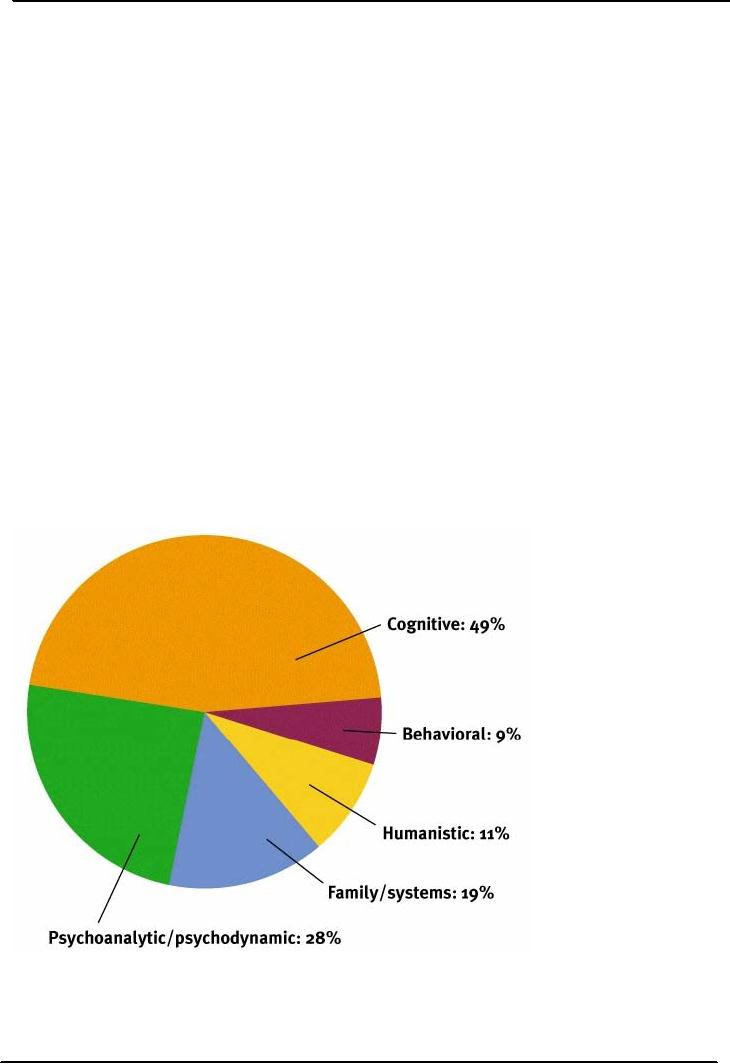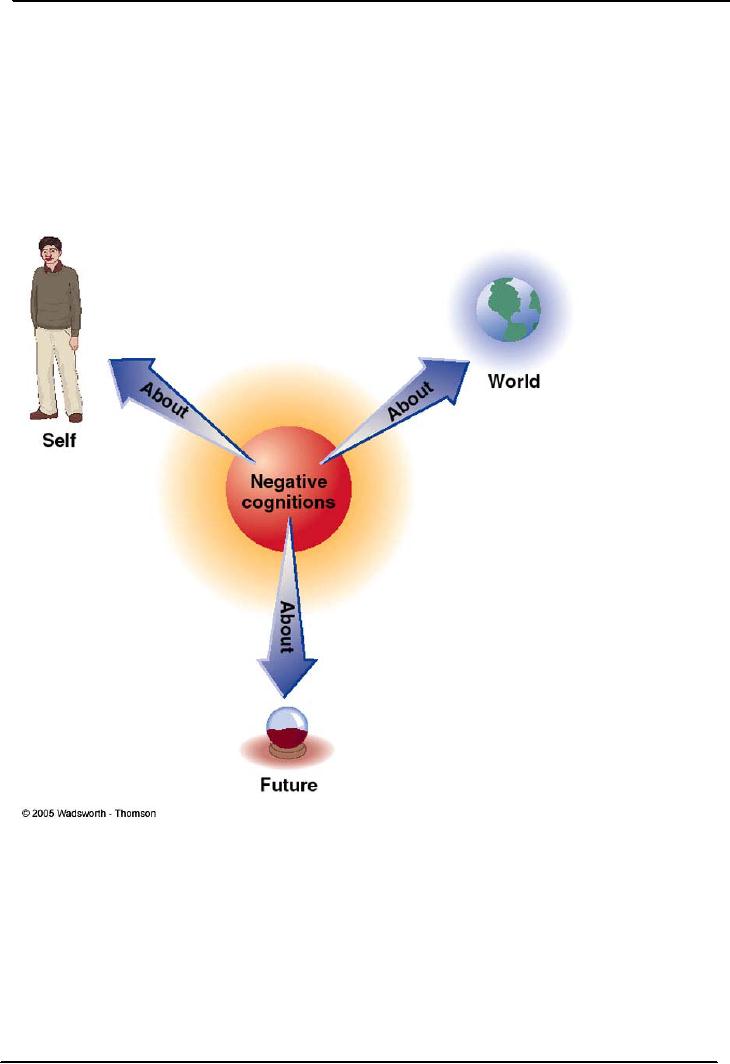 |
COGNITIVE APPROACHES TO COUNSELING:Stress-Inoculation Therapy |
| << EXISTENTIAL THERAPY:Rollo May, Role of Counselor, Logotherapy |
| COGNITIVE APPROACHES TO COUNSELING:Role of the Counselor >> |

Theory
and Practice of Counseling -
PSY632
VU
LESSON
32
COGNITIVE
APPROACHES TO COUNSELING
Cognitive
theorists agree with William
Shakespeare's Hamlet who
said "There is nothing either
good or bad
but
thinking makes it so"
Cognitions
are thoughts, beliefs, and
internal images that people
have about events in their
lives
(Holden.1993b).
Cognitive theories of counseling
focus on these mental
processes and their
influences on
mental
health. A common premise of all cognitive
theories is that how people
think largely determines
how
they
feel and behave. As Burns
(1980) points out, "every
had feeling you have is the result of
your distorted
negative
thinking"
Best-known
Cognitive Theoriess
1.
Aaron's Beck's Cognitive
Therapy
2.
Albert Ellis's Rational Emotive
Therapy
3.
Eric Berne's Transactional
Analysis
Cognitive
approaches are widely
employed to deal with anxiety
and depression. The
following bar diagram
shows
that these approaches far
exceed the other approaches of
counseling:
134

Theory
and Practice of Counseling -
PSY632
VU
Common
Aspects of cognitive
counseling
Client
Characteristics
They
are average to above-average in
intelligence.
They
have moderate to high levels
of functional distress.
They
are able to identify thoughts
and feelings.
They
are not psychotic or disable
by parent problems.
They
are willing and able to
complete systematic homework
assignments.
They
possess a repertoire of behavioral skills
and responses.
They
process information on a visual
and auditory level.
This
suggests that the clients
although distressed are not
visually impaired but suffer from
dysfunctional
automatic
thoughts (content specific to an event) and
general schemata (general
rules about themselves or
world).
Change
Strategies
Chang
strategies most often
involve the following:
Using
standardized guidelines for understanding
in a concrete manner the events in
people's lives.
Recording
or reflecting people's thoughts about
these events in a clear,
precise way.
Finding
a means to identify and
challenge distorted thoughts
Implementing
new ways of thinking that
are realistic and
productive.
Stress-Inoculation
Therapy
�
Developed
by Meichenbaum (1977)
�
Uses
inoculation training to help people
think optimistically when in
stressful situations.
�
Use
self talk or self instructions to
modify behavior
�
Inoculating
individuals to ongoing and
future stressors
�
Three
overlapping phases (Meichenbaum,
1996):
�
Conceptualizing
phase
�
Skill
acquisition and rehearsal
phase
�
Application
phase
Beck's
Cognitive Therapy
Aaron
Beck a Philadelphia psychiatric developed a
cognitive approach to mental
disorders at about the
same
time that Albert Ellis was
developing his ideas about
rational-emotive therapy (in the late
1950s and
early
1960s). He emphasized the importance of
cognitive thinking in his
theory, especially dysfunctional
thoughts
(thoughts that are nonproductive
and unrealistic).
135

Theory
and Practice of Counseling -
PSY632
VU
Beck's
Cognitive Triad
Cognitive
Errors and the Depressive
Cognitive Triad
Think
negatively about oneself
Think
negatively about the world
Think
negatively about the future
In
summary, Beck focuses on the importance
of modifying thoughts in the treatment of mental
disorders.
For
him, there are six
cognitive distortions to which the
counselor should be attuned:
1.
arbitrary inferences
2.
selective abstraction
3.
overgeneralization
4.
magnification and minimization
5.
personalization
136

Theory
and Practice of Counseling -
PSY632
VU
6.
dichotomous thinking
Arbitrary
Inference:
�
Your
friend does not call
you and you suspect he
wants to break up with
you.
Selective
perception:
�
Depressed
person focuses on negative
events while ignoring
positive life events
Overgeneralization:
�
Depressed
persons draw negative
conclusions about their self-worth, based
on minimal
data
Magnification/minimization:
�
Person
magnifies the significance of a negative
event. You miss exercising
for two days
and
you
tell yourself, "I'll never
get in shape".
Personalization:
�
Thinking
that everything negative is directed
toward oneself.
Dichotomous
thinking/ All-or-none
thinking:
�
Everything
is good or bad
Process
& Techniques
�
Uncover/challenge
self-defeating beliefs
�
Forcefully
vs. collaboratively
�
Change
these dysfunctional
beliefs
�
What
is the evidence to support this belief?
Are these facts or your
interpretation of them?
Is
there another way to look at the
situation?
�
Techniques
�
Experience
distress in therapy
�
Diary
of situation, feelings, irrational
thoughts
�
Reading
assignments
Rational
Emotive Therapy (RET)
Albert
Ellis
The
founder of rational-emotive therapy
(RET), Albert Ellis has
been described by Weinrach
(1980) as
"abrasive,
impatient, and lacking in some of the
basic social graces that my
mother spent hours
indoctrinating
me with "but also as
"brilliant, sensitive, perceptive,
humorous, and stimulating"
Albert
Ellis was born in 1913
into a Jewish family in Pittsburg,
Pennsylvania. His parents eventually
had a
daughter
and another son. Early in
his life, Ellis's family moved to
New York City, where he
has spent most
of
his life. Ellis describes
his father in positive and
neutral, although the elder Ellis
was often absent
from
home.
From his father, Ellis
believes he acquired his intelligence,
drive, and persistence. His
mother was
quite
independent for her time, often idiosyncratic in
her behavior as well as happy
and non-smothering.
Ellis
describes her way of parenting as benign
neglect.
137

Theory
and Practice of Counseling -
PSY632
VU
His
parents' divorce when he was 12 years
old caused him to give up
plans to be a Hebrew teacher,
and he
became
instead a self-described probabilistic
atbeist.
He
finally succeeded in obtaining
psychoanalytic training from the
Karen Horney group and
practiced
classic
psychoanalysis in the early 1950s.
Dissatisfied with that
approach, Ellis began the
practice of his own
theory
in 1955.
Rational-Emotive
Therapy: Background
Rational-emotive
therapy was primary a cognitive theory in
the beginning.
RET
has since broadened its
base considerably and now
includes behavioral and emotional
concepts.
Ellis
established two nonprofit institutes to
promote RET: the institute
for Rational Living, a scientific
and
educational
foundation established in 1959,
and the Institute for
Rational-Emotive Therapy, an
institution
for
professional training and clinical
services established in 1968.
Ellis, as a prolific writer,
has produced
over
500 articles, some 50 books,
and numerous films and
tapes.
View
of Human Nature
RET
assumes that people are both
"inherently rational and
irrational, sensible and
crazy"
According
to Ellis (1989), this duality is
biologically inherent and is
perpetuated unless a new way
of
thinking
is learned. Irrational linking
may include the invention of upsetting
and disturbing thoughts.
Ellis
(1962)
lists 11 common irrational beliefs
that can be quite
disturbing.
These
needs will be discussed in the
next lecture.
138
Table of Contents:
- INTRODUCTION:Counseling Journals, Definitions of Counseling
- HISTORICAL BACKGROUND COUNSELING & PSYCHOTHERAPY
- HISTORICAL BACKGROUND 1900-1909:Frank Parson, Psychopathic Hospitals
- HISTORICAL BACKGROUND:Recent Trends in Counseling
- GOALS & ACTIVITIES GOALS OF COUNSELING:Facilitating Behavior Change
- ETHICAL & LEGAL ISSUES IN COUNSELING:Development of Codes
- ETHICAL & LEGAL ISSUES IN COUNSELING:Keeping Relationships Professional
- EFFECTIVE COUNSELOR:Personal Characteristics Model
- EFFECTIVE COUNSELOR:Humanism, People Orientation, Intellectual Curiosity
- EFFECTIVE COUNSELOR:Cultural Bias in Theory and Practice, Stress and Burnout
- COUNSELING SKILLS:Microskills, Body Language & Movement, Paralinguistics
- COUNSELING SKILLS COUNSELOR’S NONVERBAL COMMUNICATION:Use of Space
- COUNSELING SKILLS HINTS TO MAINTAIN CONGRUENCE:
- LISTENING & UNDERSTANDING SKILLS:Barriers to an Accepting Attitude
- LISTENING & UNDERSTANDING SKILLS:Suggestive Questions,
- LISTENING & UNDERSTANDING SKILLS:Tips for Paraphrasing, Summarizing Skills
- INFLUENCING SKILLS:Basic Listening Sequence (BLS), Interpretation/ Reframing
- FOCUSING & CHALLENGING SKILLS:Focused and Selective Attention, Family focus
- COUNSELING PROCESS:Link to the Previous Lecture
- COUNSELING PROCESS:The Initial Session, Counselor-initiated, Advice Giving
- COUNSELING PROCESS:Transference & Counter-transference
- THEORY IN THE PRACTICE OF COUNSELING:Timing of Termination
- PSYCHOANALYTIC APPROACHES TO COUNSELING:View of Human Nature
- CLASSICAL PSYCHOANALYTIC APPROACH:Psychic Determination, Anxiety
- NEO-FREUDIANS:Strengths, Weaknesses, NEO-FREUDIANS, Family Constellation
- NEO-FREUDIANS:Task setting, Composition of Personality, The Shadow
- NEO-FREUDIANS:Ten Neurotic Needs, Modes of Experiencing
- CLIENT-CENTERED APPROACH:Background of his approach, Techniques
- GESTALT THERAPY:Fritz Perls, Causes of Human Difficulties
- GESTALT THERAPY:Role of the Counselor, Assessment
- EXISTENTIAL THERAPY:Rollo May, Role of Counselor, Logotherapy
- COGNITIVE APPROACHES TO COUNSELING:Stress-Inoculation Therapy
- COGNITIVE APPROACHES TO COUNSELING:Role of the Counselor
- TRANSACTIONAL ANALYSIS:Eric Berne, The child ego state, Transactional Analysis
- BEHAVIORAL APPROACHES:Respondent Learning, Social Learning Theory
- BEHAVIORAL APPROACHES:Use of reinforcers, Maintenance, Extinction
- REALITY THERAPY:Role of the Counselor, Strengths, Limitations
- GROUPS IN COUNSELING:Major benefits, Traditional & Historical Groups
- GROUPS IN COUNSELING:Humanistic Groups, Gestalt Groups
- MARRIAGE & FAMILY COUNSELING:Systems Theory, Postwar changes
- MARRIAGE & FAMILY COUNSELING:Concepts Related to Circular Causality
- CAREER COUNSELING:Situational Approaches, Decision Theory
- COMMUNITY COUNSELING & CONSULTING:Community Counseling
- DIAGNOSIS & ASSESSMENT:Assessment Techniques, Observation
- FINAL OVERVIEW:Ethical issues, Influencing skills, Counseling Approaches